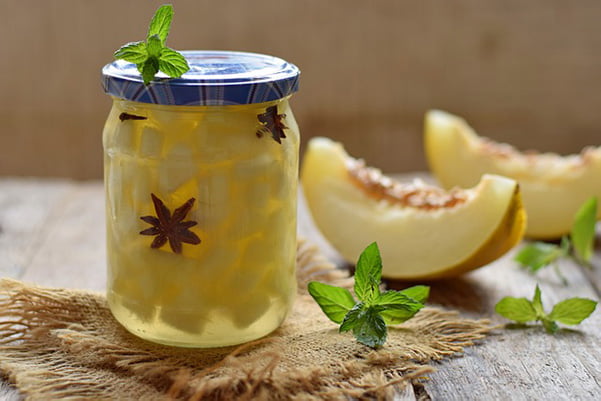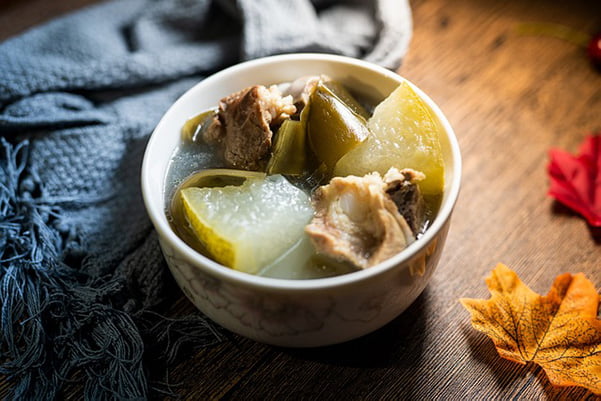Winter melon (also known as fuzzy melon, white gourd, wax guard, Chinese preserving melon, dong gua, or ash gourd) is an incredibly versatile fruit. It is such a mild-tasting fruit that, in many Asian cuisines, it's often used more like a vegetable! The white rind can be eaten raw, but it's commonly used to make winter melon soup and stir-fries. Below, we'll tell you all about this unique Asian fruit!
What Is Winter Melon?
Winter melon (Benincasa hispida), also known as ash gourd or white gourd, is a large light green fruit, usually found in an oblong shape. Primarily found in the warm climates of South and Southeast Asia, winter melons can reach extraordinary sizes of 32 inches long and a full 12 pounds! It's a member of the gourd family, along with cucumbers, pumpkins, squash, and other melons.
Winter melons thrive in warm weather, with their peak harvest time from summer to fall. So, why is it called "winter melon"? Because, compared with other gourds, it has a uniquely long shelf life and can be enjoyed during the winter!
As winter melons grow, they are covered with silvery, fine hairs that give them a frosty appearance. They are typically called "fuzzy melons" if harvested at this time. Later, the hairs give way to a whitish, powdery coating. This is why winter melons are sometimes called "ash gourd" and "wax gourd."
What Does Winter Melon Taste Like?
The taste and flavor of winter melon/ wax gourd depend largely on how mature your fruit is. Young winter melon has a distinct taste that differs from its mature counterpart. When young, the winter melon has a tender and crisp texture, similar to a cucumber. Winter melon has a gentle and delicate flavor, accompanied by a subtle touch of sweetness. The young winter melon can be eaten raw, and it has a refreshing and watery quality that makes it popular in salads and cold dishes. As the winter melon matures and grows larger, its taste becomes more pronounced and develops a slightly sweeter flavor.
Mature winter melon has a mild and slightly sweet taste, and its flavor can be compared to that of a cucumber, with a subtle hint of sweetness. The flesh of the winter melon is quite tender and has a high water content, contributing to its refreshing and cooling properties. The winter melon can be likened to a watermelon rind or a cucumber, and this unimposing taste allows it to take on the flavors it's being cooked with.
Once cooked, the winter melon readily absorbs flavors, making it a versatile ingredient for an array of dishes like soups, stews, and stir-fries. The texture of a winter melon is very similar to a zucchini.

Benefits Of Eating Winter Melon
Winter melon has many health benefits that will have you looking to add it to your diet!
Rich In Vitamins
Many vitamins are found in winter melon or ash gourd, but the main two are Vitamin C and Vitamin B2 (also known as riboflavin). Vitamin C is critical for immune support and collagen production; vitamin B2 helps your vision.
Rich In Minerals
Winter melon contains small amounts of many minerals that are essential to your well-being, such as calcium, iron, magnesium, and zinc. These minerals promote strong bones, healthy blood, and a properly functioning nervous system.
Promote Weight Loss
Healthy eating, in general, will promote weight loss, but winter melon has qualities that make it a popular food for people wanting to shed some pounds. It's 96% water, keeping you hydrated and satiated. It's also high in dietary fiber, which helps regulate your digestive system and keep you feeling full.
Rich In Antioxidants
Research indicated winter melon is rich in polyphenols, flavonoids, and anthocyanins. Making this fruit a functional food can potentially reduce inflammation activity.
May Boost the Immune System
According to USDA, 100g of raw wax gourd contains 13 mg (14%DV) of vitamin C. This makes this fruit a powerful immune booster and helps fight infections and diseases.
Fiber Rich
The winter melon or wax gourd is fiber-rich, making it a great addition to the American diet. A 100g of raw wax gourd contains approximately 3 grams of dietary fiber. Fiber can help reduce calorie consumption, aid digestion, and help digestive issues like constipation.
May Help Detoxify The Body
In traditional Chinese medicine, winter gourd is used as a diuretic and helps detoxify the body through urination and support the liver and kidneys to perform at their optimum level.
How To Clean And Prepare Winter Melon
When you get your ash gourd home, here's how to prepare it for cooking.
Rinse the winter melon
Rinse the outside of the melon until it's thoroughly clean. Mature winter melons grow a powdery, waxy coating that needs to be scrubbed off.
Trim the ends
To facilitate peeling and create a stable cutting surface, utilize a sharp knife for trimming off both ends of the winter melon. This will ensure greater ease and precision during the peeling process.
Peel the skin
To remove the outer skin of the winter melon, you can employ either a vegetable peeler or a knife. Make long, downward strokes to remove the green or white skin, revealing the light green or white flesh underneath. It is important to make sure that you remove all of the skin since it is tough and generally not consumed.
Cut in half
After peeling off the skin, proceed to cut the winter melon in half lengthwise. You can use a large knife or a cleaver to do this. If the winter melon is large, you may want to cut it into smaller, manageable pieces.
Scoop out the seeds
Utilize a spoon or scoop to effectively remove the seeds and fibrous center from the winter melon. You can save them to roast or boil. Otherwise, you can toss them.
Slice or dice
Depending on your recipe or preference, you can now slice or dice the winter melon into the desired shape and size. It can be cut into thin slices, cubes, or any other shape that suits your dish.
Rinse again (optional)
If you prefer, you can give the winter melon pieces a final rinse to remove any remaining seeds or residue before using them in your recipe.

How To Eat Winter Melon
Winter melon should not be consumed raw, as it will have a sharp, unpleasant bite. You can, however, juice it or blend raw winter melon with other ingredients to make it taste delicious. Before you eat the fruit, you must remove the skin and seed first and then cook the flesh.
The flesh of the fruit can be simmered, steamed, grilled, roasted, stir-fried, or boiled. When it's fully cooked, winter melon flesh will become soft and makes a great addition to :
Soup and stews
Casseroles
Curries
Dessert (cake, pies, and others)
Candies
Juice/ winter melon juice or add to smoothies
Winter Melon Seeds
Winter melon seeds are edible, and you can roast them just like pumpkin seeds.
How To Cook Winter Melon
Winter melon is an incredibly versatile fruit, and there are many ways to cook it! You can find many winter melon recipes online, and simmering is the most common way to cook winter melon. While the ash gourd is simmering, you can add other ingredients to tailor it to the final recipe.
For example, you can simmer winter melon with chicken, ham, mushrooms, or scallops to make a winter melon soup. Steamed winter gourds can be cooked down with brown sugar to make a popular winter melon tea. Since immature winter melon tastes sweet, you can simmer it to make a sweet filling for the popular Chinese Wife Cake (also known as a Sweetheart cake).
Winter melon is also often steamed or parboiled, which gives a similar soft, mild taste. However, if you'd like your winter melon pieces to take on the more powerful flavors of savory dishes, consider braising or stir-frying them first. This helps the melon hold its form longer, so it has time to soak up spices and other flavors.
Where To Buy Winter Melons
You can find winter melon in Asian markets all year round, although not always in the same form. When winter melons are in season (late summer through the fall), you can find whole winter melons on the store shelves. Otherwise, you'll likely see winter melon packaged in slices or cubes.
Whether you buy a whole winter melon or precut, select a firm and unbruised melon.
How To Choose An Winter Melon
When shopping for a winter melon, seek one that has a dark green or pale green rind, firm and heavy to hold. It should have no hair and have a waxy coating. Avoid any winter melon with cracks and bruises.
How To Store Winter Melon
Winter melon has a long shelf life - up to a year! However, this is dependent on how you store them.
Sliced
Sliced winter melon should be placed in a plastic bag or airtight container and placed in the crisper drawer of your fridge. It will stay fresh for up to 5 days.
Pickled
Winter melon is frequently pickled. Cut your melon into equal-sized parts, then place them in a jar with vinegar and your choice of pickling spices. Pickled winter melons can stay unopened in a pantry for up to a year and open in the fridge for six months.
Store It Whole
The best (and easiest!) way to store winter melon is as a whole gourd. Store your whole winter melon in a cool, dry place - such as a pantry, basement, or root cellar. It will stay fresh for up to a year.
Freeze It
A great way to store the fruit is to freeze it, which will not damage its texture. Slice it up, place it in an airtight container or freezer-safe bag, and store it in the freezer until you are ready to use it.
When is Winter Melon In Season
In the United States, winter melon is typically in season during the late summer and fall months. The exact timing may vary slightly based on the particular region and climate conditions. Generally, you can expect to find fresh winter melon available from late July or August through October or November.
Where To Buy Winter Melon In the US
Check your local farmers' markets, fresh produce markets, or regular grocery stores with a good selection of fruits and vegetables. They often carry winter melon, especially in areas with a significant Asian population. Otherwise, you can find winter melon in Asian supermarkets.
